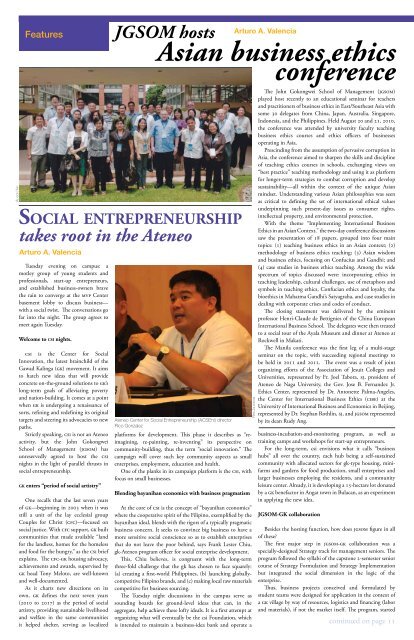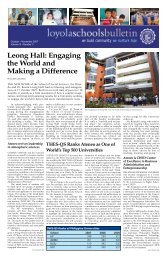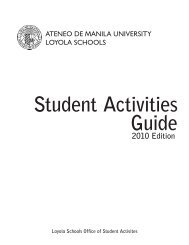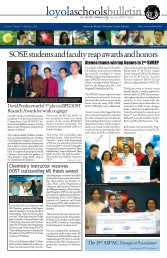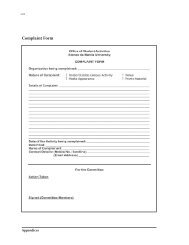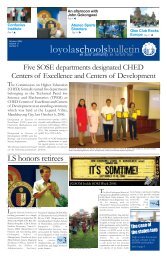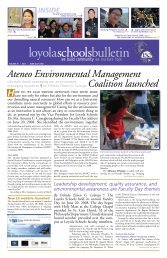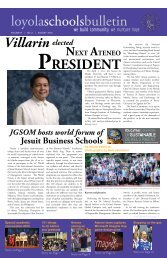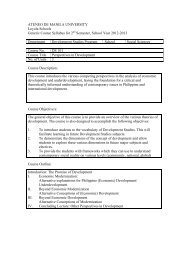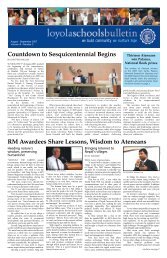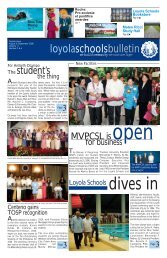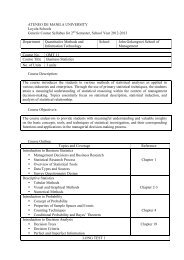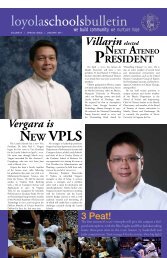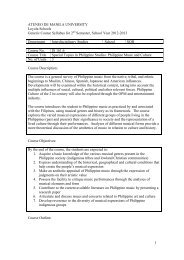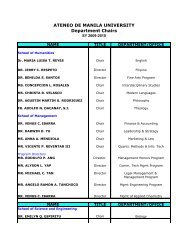ORO, & DAVAO - Ateneo de Manila University
ORO, & DAVAO - Ateneo de Manila University
ORO, & DAVAO - Ateneo de Manila University
You also want an ePaper? Increase the reach of your titles
YUMPU automatically turns print PDFs into web optimized ePapers that Google loves.
6 loyolaschoolsbulletin we build community we nurture hope<br />
Features JGSOM hosts<br />
Arturo A. Valencia<br />
Asian business ethics<br />
conference<br />
Alyson Yap<br />
Social entrepreneurship<br />
takes root in the <strong>Ateneo</strong><br />
Arturo A. Valencia<br />
Tuesday evening on campus: a<br />
motley group of young stu<strong>de</strong>nts and<br />
professionals, start-up entrepreneurs,<br />
and established business-owners brave<br />
the rain to converge at the mvp Center<br />
basement lobby to discuss business—<br />
with a social twist. The conversations go<br />
far into the night. The group agrees to<br />
meet again Tuesday.<br />
Welcome to csi nights.<br />
csi is the Center for Social<br />
Innovation, the latest brainchild of the<br />
Gawad Kalinga (gk) movement. It aims<br />
to hatch new i<strong>de</strong>as that will provi<strong>de</strong><br />
concrete on-the-ground solutions to gk’s<br />
long-term goals of alleviating poverty<br />
and nation-building. It comes at a point<br />
when gk is un<strong>de</strong>rgoing a renaissance of<br />
sorts, refining and re<strong>de</strong>fining its original<br />
targets and steering its advocacies to new<br />
paths.<br />
Strictly speaking, csi is not an <strong>Ateneo</strong><br />
activity, but the John Gokongwei<br />
School of Management (jgsom) has<br />
unreservedly agreed to host the csi<br />
nights in the light of parallel thrusts in<br />
social entrepreneurship.<br />
gk enters “period of social artistry”<br />
One recalls that the last seven years<br />
of gk—beginning in 2003 when it was<br />
still a unit of the lay ecclesial group<br />
Couples for Christ (cfc)—focused on<br />
social justice. With cfc support, gk built<br />
communities that ma<strong>de</strong> available “land<br />
for the landless, homes for the homeless<br />
and food for the hungry,” as the csi brief<br />
explains. The cfc-gk housing advocacy,<br />
achievements and awards, supervised by<br />
gk head Tony Meloto, are well-known<br />
and well-documented.<br />
As it charts new directions on its<br />
own, gk <strong>de</strong>fines the next seven years<br />
(2010 to 2017) as the period of social<br />
artistry, providing sustainable livelihood<br />
and welfare in the same communities<br />
it helped shelter, serving as localized<br />
<strong>Ateneo</strong> Center for Social Entrepreneurship (ACSEnt) director<br />
Rico Gonzalez<br />
platforms for <strong>de</strong>velopment. This phase it <strong>de</strong>scribes as “reimagining,<br />
re-painting, re-inventing” its perspective on<br />
community-building, thus the term “social innovation.” The<br />
campaign will cover such key community aspects as small<br />
enterprises, employment, education and health.<br />
One of the planks in its campaign platform is the csi, with<br />
focus on small businesses.<br />
Blending bayanihan economics with business pragmatism<br />
At the core of csi is the concept of “bayanihan economics”<br />
where the cooperative spirit of the Filipino, exemplified by the<br />
bayanihan i<strong>de</strong>al, blends with the rigors of a typically pragmatic<br />
business concern. It seeks to convince big business to have a<br />
more sensitive social conscience so as to establish enterprises<br />
that do not leave the poor behind, says Frank Lester Chiu,<br />
gk-<strong>Ateneo</strong> program officer for social enterprise <strong>de</strong>velopment.<br />
This, Chiu believes, is congruent with the long-term<br />
three-fold challenge that the gk has chosen to face squarely:<br />
(a) creating a first-world Philippines, (b) launching globallycompetitive<br />
Filipino brands, and (c) making local raw materials<br />
competitive for business sourcing.<br />
The Tuesday night discussions in the campus serve as<br />
sounding boards for ground-level i<strong>de</strong>as that can, in the<br />
aggregate, help achieve these lofty i<strong>de</strong>als. It is a first attempt at<br />
organizing what will eventually be the csi Foundation, which<br />
is inten<strong>de</strong>d to maintain a business-i<strong>de</strong>a bank and operate a<br />
Rani Jalandoni<br />
The John Gokongwei School of Management (jgsom)<br />
played host recently to an educational seminar for teachers<br />
and practitioners of business ethics in East/Southeast Asia with<br />
some 30 <strong>de</strong>legates from China, Japan, Australia, Singapore,<br />
Indonesia, and the Philippines. Held August 20 and 21, 2010,<br />
the conference was atten<strong>de</strong>d by university faculty teaching<br />
business ethics courses and ethics officers of businesses<br />
operating in Asia.<br />
Prescinding from the assumption of pervasive corruption in<br />
Asia, the conference aimed to sharpen the skills and discipline<br />
of teaching ethics courses in schools, exchanging views on<br />
“best practice” teaching methodology and using it as platform<br />
for longer-term strategies to combat corruption and <strong>de</strong>velop<br />
sustainability—all within the context of the unique Asian<br />
mindset. Un<strong>de</strong>rstanding various Asian philosophies was seen<br />
as critical to <strong>de</strong>fining the set of international ethical values<br />
un<strong>de</strong>rpinning such present-day issues as consumer rights,<br />
intellectual property, and environmental protection.<br />
With the theme “Implementing International Business<br />
Ethics in an Asian Context,” the two-day conference discussions<br />
saw the presentation of 18 papers, grouped into four main<br />
topics: (1) teaching business ethics in an Asian context; (2)<br />
methodology of business ethics teaching; (3) Asian wisdom<br />
and business ethics, focusing on Confucius and Gandhi; and<br />
(4) case studies in business ethics teaching. Among the wi<strong>de</strong><br />
spectrum of topics discussed were: incorporating ethics in<br />
teaching lea<strong>de</strong>rship, cultural challenges, use of metaphors and<br />
symbols in teaching ethics, Confucian ethics and loyalty, the<br />
bioethics in Mahatma Gandhi’s Satyagraha, and case studies in<br />
<strong>de</strong>aling with corporate crises and co<strong>de</strong>s of conduct.<br />
The closing statement was <strong>de</strong>livered by the eminent<br />
professor Henri-Clau<strong>de</strong> <strong>de</strong> Bettignies of the China European<br />
International Business School. The <strong>de</strong>legates were then treated<br />
to a social tour of the Ayala Museum and dinner at <strong>Ateneo</strong> at<br />
Rockwell in Makati.<br />
The <strong>Manila</strong> conference was the first leg of a multi-stage<br />
seminar on the topic, with succeeding regional meetings to<br />
be held in 2011 and 2012. The event was a result of joint<br />
organizing efforts of the Association of Jesuit Colleges and<br />
Universities, represented by Fr. Joel Tabora, sj, presi<strong>de</strong>nt of<br />
<strong>Ateneo</strong> <strong>de</strong> Naga <strong>University</strong>, the Gov. Jose B. Fernan<strong>de</strong>z Jr.<br />
Ethics Center, represented by Dr. Antonette Palma-Angeles,<br />
the Center for International Business Ethics (cibe) at the<br />
<strong>University</strong> of International Business and Economics in Beijing,<br />
represented by Dr. Stephan Rothlin, sj, and jgsom represented<br />
by its <strong>de</strong>an Rudy Ang.<br />
business-incubation-and-monitoring program, as well as<br />
training camps and workshops for start-up entrepreneurs.<br />
For the long-term, csi envisions what it calls “business<br />
hubs” all over the country, each hub being a self-sustained<br />
community with allocated sectors for gk-type housing, minifarms<br />
and gar<strong>de</strong>ns for food production, small enterprises and<br />
larger businesses employing the resi<strong>de</strong>nts, and a community<br />
leisure center. Already, it is <strong>de</strong>veloping a 15-hectare lot donated<br />
by a gk benefactor in Angat town in Bulacan, as an experiment<br />
in applying the new i<strong>de</strong>a.<br />
JGSOM-GK collaboration<br />
Besi<strong>de</strong>s the hosting function, how does jgsom figure in all<br />
of these<br />
The first major step in jgsom-gk collaboration was a<br />
specially-<strong>de</strong>signed Strategy track for management seniors. The<br />
program followed the syllabi of the capstone 2-semester senior<br />
course of Strategy Formulation and Strategy Implementation<br />
but integrated the social dimension in the logic of the<br />
enterprise.<br />
Thus, business projects conceived and formulated by<br />
stu<strong>de</strong>nt teams were <strong>de</strong>signed for application in the context of<br />
a gk village by way of resources, logistics and financing (labor<br />
and materials), if not the market itself. The program, started<br />
continued on page 11


